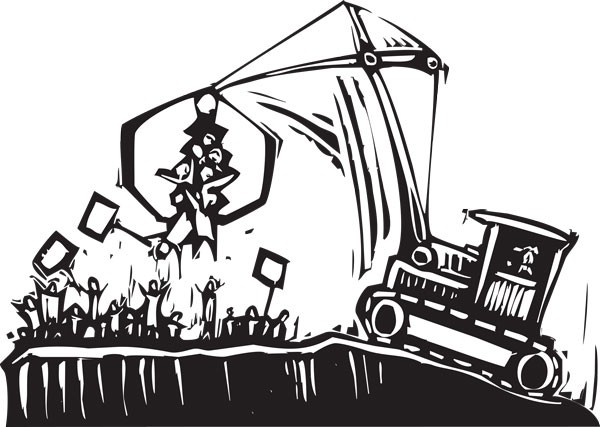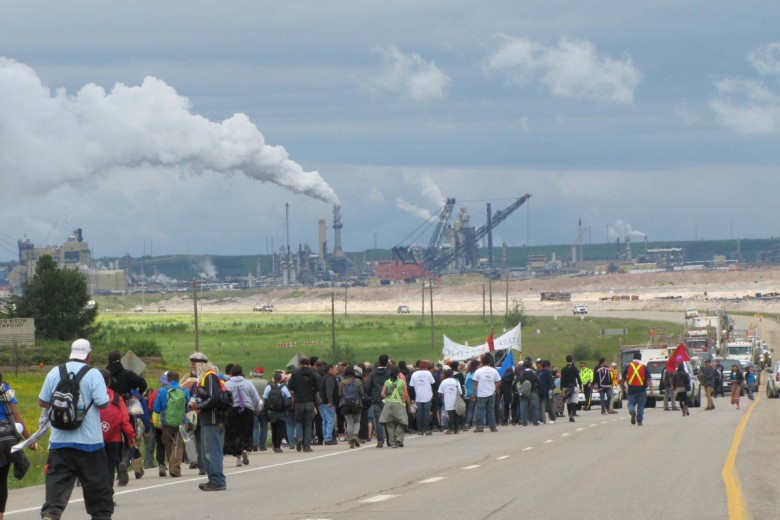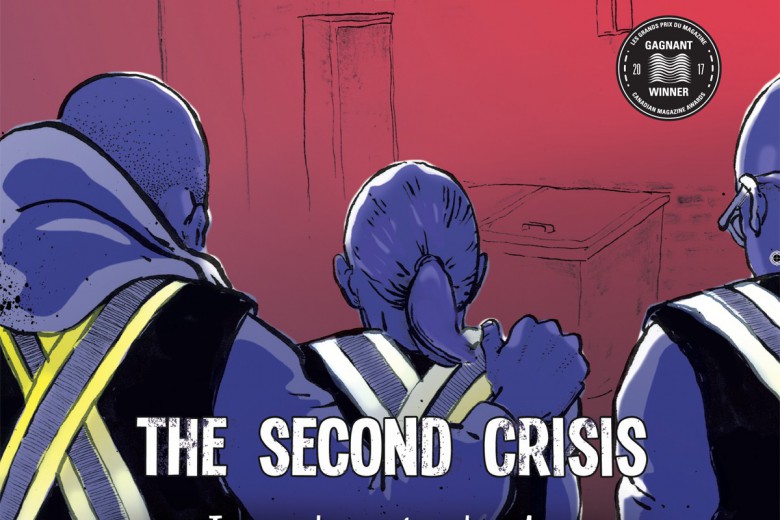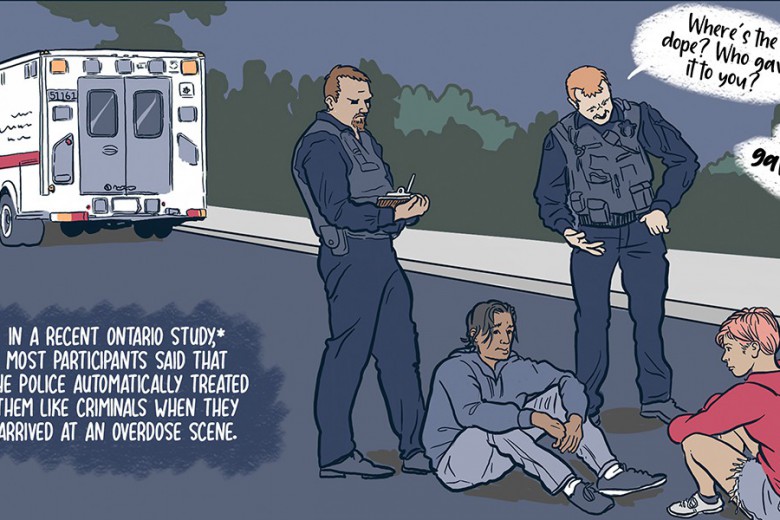
Saskatchewan’s labour laws are being rewritten. Already, the governing Saskatchewan Party has made it more difficult for workers to unionize, and has given employers more freedom to interfere during union campaigns. As the first province to grant public servants the right to unionize, Saskatchewan was once home to Canada’s most progressive labour legislation. It still boasts one of the highest union density rates in the country. But this could change. Is Saskatchewan now the setting for a Wisconsin-style assault on trade union rights? Will the comprehensive changes to labour legislation that unfold in the province be a model for right-wing parties across Canada that seek to curb the political and economic influence of unions?
When the right-wing Saskatchewan Party was first elected in November 2007, unions anticipated a fight. Under a highly popular and charismatic leader, Premier Brad Wall, the Sask Party was quick to act on these expectations. Part of their sweeping changes involved the removal of three senior members of the Saskatchewan Labour Relations Board (SLRB) before the end of their appointments in March 2008.
The Canadian Association of Labour Lawyers (CALL), the Saskatchewan Federation of Labour, and other trade unions accused the government of jeopardizing the SLRB’s status as an independent and impartial tribunal. Kenneth Love, a lawyer who had represented employers before the Board in a decertification campaign, was appointed as the new SLRB Chair, drawing the ire of organized labour. Considering that the Labour Board is responsible for ruling on unfair labour practices and union certifications, the change was rightly contested by unions.
Six months after the election, the government used its majority mandate to turn Bills 5 and 6 into law, known respectively as the Public Services Essential Services Act and the Trade Union Amendment Act. Bill 6 ended the card check provisions in the Trade Union Act – the primary method for workers to organize into a union – making mandatory a secret ballot certification vote only after 45 per cent of workers signed a union card. Rob Norris, then Minister of Labour, argued that the changes brought “balance” to laws dealing with union certification and made workplaces more “democratic.” Employers were also granted the right to “communicate” facts and opinions with their employees during organizing drives. These changes have made Saskatchewan one of the toughest provinces in which to unionize.
The Public Services Essential Services Act (PSESA) was more profound since it gave public-sector employers the power to deem certain services as essential, with a limited recourse for appeal by unions. Public-sector workers who fall into these categories are prohibited from withholding their labour in the event of a strike or lockout. While other forms of essential services laws exist in Canada, and governments in Saskatchewan, including the NDP, have legislated an end to strikes, nothing so far has been as comprehensive as the PSES Act. Like their Conservative counterparts in Ottawa, the Sask Party wielded the interests of public safety and economic stability as the motivation behind this unprecedented piece of legislation. The government also took advantage of public opinion, which is generally unsupportive of strikes by public-sector workers.
The Saskatchewan Federation of Labour (SFL) was quick to challenge the constitutionality of both pieces of legislation. In February of 2012, Court of Queen’s Bench Justice Dennis Ball delivered a ruling that should be considered a partial victory for trade unions in the province and across Canada. The SFL made the case that Bills 5 and 6 infringed upon basic rights guaranteed by the Charter of Rights and Freedoms. Regarding Bill 6, Ball dismissed the SFL’s appeal by ruling that nothing in the Amendment Act violated the Charter. Changes to the certification process therefore remain in effect. In the case of the PSES Act, Ball concluded that the law infringes on the freedom of association of employees protected by section 2(d) of the Charter (Freedom of Association), and declared the Act to be of no force or effect. However, Ball gave the government 12 months before invalidating the law. But the point was clear – workers have a constitutional right to strike in order to collectively bargain.
The deciding factor for Ball was not so much the government’s establishment of essential services legislation, but cases where employers were granted the power to unilaterally designate employees as essential. Neither unionized workers nor their unions could appeal this decision within the framework of the PSES Act, which prohibits individuals from exercising their right to collective bargaining.
Wall and his government apologized for the misdeed and promised to consult with public-sector unions when revising the legislation. The miscalculation was sold as the consequence of a crass and inexperienced government that thought itself free to introduce legislation without consultation. But the wider implications of Ball’s decision, that workers have a right under the Charter to strike, were too serious for the government to let go uncontested. An appeal was launched in March, and the parties are still awaiting decision. Ultimately this case will likely be decided by the Supreme Court of Canada.
By the time Justice Ball issued his ruling, the Sask Party was in its second majority term. The New Democrats were reduced to a mere nine seats during the November 2011 election, and the government walked away with 64 per cent of the popular vote – the largest figure in the province’s electoral history. Wall had become one of the most popular politicians in Canada, and much of his victory can be attributed to votes he and his party received from the traditional supporters of the NDP – namely trade union members and urban residents. During the election the Premier mused that he was “Open to unions collecting their own dues,” in an infamous Twitter feed. Wall eventually backpedaled on his remark, and suggested instead that certain groups, like young people, ought to be given a break from union dues. Aside from these clumsy exchanges there were no other references to labour law reform during the campaign.
However, on May 2, 2012, the Ministry of Labour Relations and Workplace Safety released the “Consultation Paper on the Renewal of Labour Legislation in Saskatchewan,” a 33-page document aimed at modernizing and simplifying the province’s 15 separate pieces of labour legislation. Up for review were a number of politically contentious areas, namely automatic dues checkoff, union financial transparency, certification and decertification processes, essential services, hours of work, and so on. While the government is working under the assumption that labour legislation needs to reflect today’s flexible work arrangements and global economy, there is no evidence that a unified labour code will yield the financial dividends that proponents anticipate. What is germane to this discussion is the undemocratic nature of the process.
No one outside of government knew about the consultation paper until the morning of its release. Unions, business associations, and the general public were told they had until July 31 to submit written reports directly to the Ministry. This call-out came less than two weeks before the legislature went into summer recess. A 20-person advisory committee comprised of employer associations, labour, and “public interest” groups (members of the latter group appear to represent business interests) was established to provide recommendations to Labour Minister Don Morgan.
Despite the perception that the Committee would be responsible for reviewing the written submissions, it will in fact only be provided with a summary compiled by the Ministry of Labour. Apart from a handful of meetings convened with individual stakeholders, not a single public hearing was scheduled as part of the consultation process. It’s fair to say that the government is looking for a pass from the public and the courts, not an A+ for civic engagement and consultation.
The Canadian Association of Labour Lawyers and a number of labour organizations were quick to condemn the government for what they considered a consultation process in name only. Even the Saskatchewan Chamber of Commerce, hardly an enemy of Wall and the Sask Party, wrote in their submission that future reviews of legislation should allow for a longer period of time. The NDP’s response was to schedule a round of town hall meetings across the province in September, but the Minister of Labour shrugged this off as a political stunt that is too late in the consultation timeline. Some trade unions have even expressed support for a review of labour regulations, provided there is a sincere, thorough, and balanced examination. It is clear that the Sask Party has abided by a philosophy that the process of “consultation” can take the form of their choosing. But why the impatience?
Trade unionists and other critics of the government suspect that the accelerated policy review is merely a smokescreen for legislation that has already been drafted. By labelling the document a consultation paper and inviting trade unions, business representatives, and the general public to comment on the provocative reforms, this will fend off accusations that the government has refused to consult affected parties, a requirement established in the famous B.C. Health Services decision of 2007. After all, the Ministry has received more than 3,800 written submissions. Soliciting feedback also provides the government with a sense of how the public might react to changes to labour legislation, or if it should be so bold as to tamper with the most sensitive foundations of industrial relations – namely, the end to automatic dues collection, allowing unionized employees to opt out of paying union dues altogether, and forcing unions to make financial information open to the public. All three of these recommendations have the support of Saskatchewan’s leading business lobby organizations, the Canadian Federation of Independent Business, and the Saskatchewan Chamber of Commerce.
Saskatchewan’s trade unions now find themselves in the eye of the storm. It’s likely that whatever legislation the government has planned will be introduced this November. There is reason to believe that Minister Morgan will avoid touching the most politically charged reforms, like dues checkoff. This could depend, of course, on how Premier Wall navigates the militant conservatives within his caucus and the various business lobby groups in Saskatchewan. And while the Sask Party has a vested interest in using the auspices of financial transparency as a means to curb the political influence (and spending) of trade unions, exposing private finances to the public represents a Pandora’s box which the government, and their allies in business, should be wary of opening.
Still, unions should expect the fight that began in 2007 to continue. Ball’s decision has provided some ammunition, or perhaps a shield, for unions that find security in the constitutional entrenchment of collective bargaining and the right to strike. But these tools need to be used, and the conflict ahead cannot be confined to the courts. Unions in Saskatchewan must be ready to wage a political and social campaign against the undoing of labour regulations that have historically set a progressive standard for jurisdictions across Canada. To do so will require the support and mobilization of union and non-union workers in Saskatchewan.






